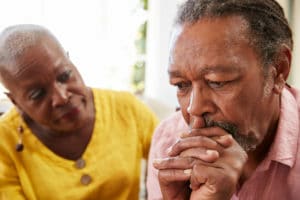
- Fears – Anxiety about death, financial problems or health issues
- Health problems – Illness, disability, chronic pain and cognitive decline
- Loneliness and isolation – Living alone, dwindling social circle due to deaths or relocation, decreased mobility and loss of driving privileges
- Reduced sense of purpose – Loss of identity due to retirement or physical limitations
Treatment rates are much lower in seniors than in teens or younger adults, which may be because older adults display depression symptoms differently. Here are some signs that your senior loved one may be depressed.
Appetite Loss
Many older adults with depression eat less than they normally would. They may have trouble going to the store or have lost their appetite. This often causes unintentional weight loss, which can lead to functional decline in activities of daily living (ADLs), and an increased risk of developing fractures and infections.
Confusion and Forgetfulness
Memory problems do not always signal dementia. If your loved one is suddenly having trouble concentrating or making decisions, they could be experiencing a major depressive episode – a period lasting at least two weeks involving persistent sadness or loss of interest in nearly all activities. Depression causes rapid mental decline and depressed older adults are more likely to notice and worry about their forgetfulness than those with dementia.
Lack of Energy
Aging does not slow all seniors down. In fact, many take part in physical activities with family and friends. If you notice your loved one is not as active or social as they used to be, it could be a sign that they are depressed.
Depression can cause sleep disturbances that affect energy levels. Older adults may have trouble falling or staying asleep and they may be so tired during the day that they miss out on events they once loved.
Insomnia is also a risk factor for depression, especially in seniors. Medical experts recommend treatment with the hormone melatonin or low doses of antidepressants, such as doxepin and trazodone.
Neglecting Personal Care
Older adults with depression may no longer take care of themselves as they once did. If your senior family member is bathing or shaving less frequently, wearing dirty clothes or forgetting to take their medications, they may be depressed. You can help by offering to do their laundry or making meals to show that you care about them.
Suicidal Thoughts
Suicide is often thought to be more common in young adults, but the highest rates are actually among adults between 45 and 64 years old and those older than 85. If your loved one is showing any signs of suicidal thoughts or behavior, seek medical attention immediately.
Unexplained Aches and Pains
While most of us think depression and sadness go hand in hand, many depressed seniors say they do not feel sad at all. Instead, they may complain about unexplained or aggravated aches, such as arthritis pain or worsening headaches. Medical conditions that cause this pain can trigger depression or make symptoms worse. Some medications also have side effects that contribute to depression. A doctor can help your loved one find the best treatment strategy that takes into account both their physical and emotional needs.
High-Quality Care in Atlanta
If your loved one is struggling with health issues, they need the support of family and qualified caregivers to help them cope. A.G. Rhodes Health & Rehab offers many care options, including rehabilitation, short-term recovery and long-term nursing, so you can feel confident that your senior family member will be taken care of.
Call 877-918-6413 or contact us online to learn more about our services.

